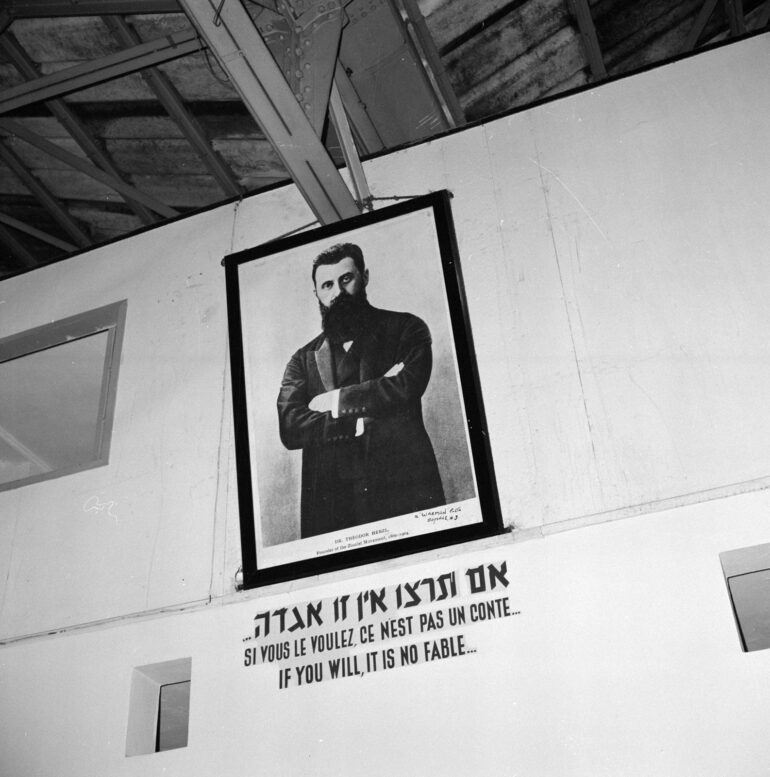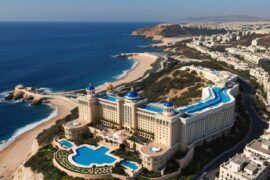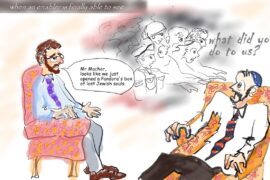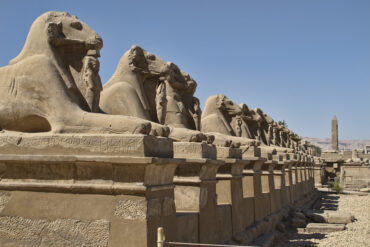The World Zionist Organization marked the 125th anniversary of the first Zionist Congress last week in Basel, Switzerland, where Binyamin Z’ev Herzl famously declared that “We shall live at last as free men on our own soil.”
Regardless of how we might feel about the usefulness (or wastefulness) of such an event that brought hundreds of Jews to Basel instead of Jerusalem, we must acknowledge that Herzl’s then-dream is now a flourishing reality in the form of the modern State of Israel in the historical homeland of the Jewish people.
But now, 125 years later, what is the new dream?
The considerations of the past
The world is much different than it was when Jewish leaders convened in Basel on August 29, 1897.
At that time, the fledging Ottoman Empire ruled over Palestine. Herzl recognized this fact and put it into action with his meeting with Sultan Abdul Hamid II. The late 19th to early 20th Century was a period ripe for change. Nationalist movements sprung up as the industrial revolution upended traditional industry. This, coupled with a great empire in decline, inspired ambitious leaders like Herzl to spring to action.
Herzl’s vision of Jewish nationalism as it pertained to a Jewish state – as he outlined in his pamphlet aptly titled “The Jewish State” – was one of a Jewish-majority colony of a great power, such as the Ottomans or the British. This pragmatic quasi-nationalism made sense to many at the time and often guided the thinking of several pre-state Zionist leaders such as future Prime Minister David Ben-Gurion.
But ultimately this idea came into conflict with the many of the Jewish residents of Palestine, who ultimately fought against Ottoman and British rule in order to establish an independent Jewish state.
Considerations for the present
The global state of affairs looks eerily similar today as it did 125 years ago. Today’s leading power, the United States, has begun a historic decline that has become increasingly obvious over the last decade. Proxy wars across the continents have created power vacuums and emboldened local despots as the post-World War II US-led order has left many feeling worse than they did before.
Israel is no different. The modern Jewish state founded in the aftermath of World War II was, for better or worse, wholly reliant on the global powers for its survival for most of the first could decades of its existence. This changed in the course of six days in 1967, when Israel famously fought off the much larger surrounding Arab armies in less than a week, leading to the reunification of Jerusalem and the capture of the West Bank, Gaza, Sinai and the Golan.
More so than Israel’s new standing on the global stage, the Israeli population began to take on a new form of national consciousness, only this time rooted in an entirely different vision.
Israel’s new direction
The state’s founders envisioned an outpost of Western civilization with Jewish tradition serving merely as an auxiliary function in society. All this changed after the Six Day War, with a surge of immigration and a conception of Israel’s destiny helping to shape a new vision for the state’s future.
All aspects of Israeli society felt it, though slow at first, culminating in the election of Prime Minister Menaḥem Begin in 1977, the first non-Labor government since the state’s foundation.
Idealistic young Jews began to build new communities in previously Jordanian-occupied land, solidifying a Jewish presence in much of Israel’s central mountain region.
But since 1967, the State of Israel and its population has been struggling to come to terms with its true identity.
Those who focus on what makes Israel unique see a historic national mission that requires the entirety of the Jewish homeland as part of our state.
Those who focus on Israel’s material success – and see such success as stemming from our adherence to the values of the “enlightened nations” – desire that Israel be an outpost of Western civilization in what they view as an otherwise savage region, believing that the only path forward is one in which Israel for the most part discards its particularist identity so it can present less Jewish and more Western.
These converging perspectives, of course, produce radically different conclusions when it comes to territorial and cultural issues.
What does the future hold?
The Israel of today would rightfully exceed any of Herzl’s wildest dreams when he first addressed the World Zionist Congress 125 years ago. Israel today has one of the strongest militaries, advanced economies, and a thriving culture. Not a week goes by without a remarkable achievement by Israel or Israelis making the headlines. Israel has truly become a beacon of hope for so many across the world.
But what next?
Looking at the situation from a purely demographic lens, the socio-cultural trajectory of Israeli society is clear. The fastest growing segments of Israel’s Jewish population are the ḥaredi and national-religious sectors. These groups, identifying strongly with the Torah and Israel’s particularist identity, are sure to make up the majority of Israel within the next 30-50 years, and as such will find themselves at the helm of power in government and the military.
Despite what many politicians and journalists claim today, this reality appears inevitable. If Israel is to continue to be the beacon of hope it has been, it must work to strengthen these growing segments rather than demonize them. In doing so, Israel can find itself in an even greater place than it is today,





